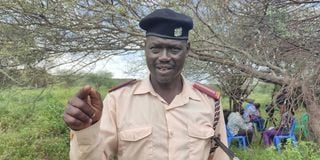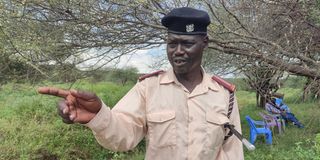Premium
Bandits killed Baringo chief's two sons, made him a pauper

Yatya Location Chief Jackson Keitany during an interview at Kagir Village on July 16, 2024.
What you need to know:
- The attackers had been trailing the livestock from the grazing fields.
- They killed the minors before making away with dozens of livestock.
Yatya Chief Jackson Keitany has been raided by bandits more than four times since 2012, rendering him a pauper. But this is not the only tragedy to befall him.
On February 26, 2024, bandits raided his home in Baringo North Sub-county and shot dead his two teenage sons before stealing his livestock.
The two boys aged 14 and 17 and who were in Grade Eight and Form Two respectively were having a cup of tea after driving their father’s livestock to the cattle shed when rustlers struck their Rormoch village home.
The national government administration official was barely a few months old in the village where he had fled to following a flare-up of violence in Yatya.
The attackers had been trailing the livestock from the grazing fields. They struck and killed the minors on the spot before making away with dozens of livestock towards Kositei in the neighbouring Tiaty Sub-county.
The administrator believes the attack was meant to intimidate him because he has been vocal in condemning banditry in the area while leading the arrest of suspected criminals.
“They killed my children and stole all my livestock but that will not stop me from doing my work. God will give me more livestock and that is what keeps me going,” he told the Nation.
“I harbour no illwill towards anyone or any community.”
The chief said he has been displaced more than four times since 2012, fleeing on those occasions to Natur, Enywa and Yatya.
He said more than 200 families in Yatya were displaced early this year and over 18 killed. Scores more are nursing gunshot wounds.
During a raid in 2015, the chief lost more than 41 heads of cattle to armed attackers who killed his herdsman, Zephaniah Chemwei, at a grazing fields in Sangorok village.
“I have lost my entire herd numbering more than 400 goats and 41 heads of cattle. The 161 goats they took in the February raid after killing my sons is what I had remained with. I have been left to depend on my monthly pay to survive and provide for my family,” said the father of 11.
Despite his tragic string of losses, Chief Keitany is hopeful that mechanisms put in place by the government to restore peace in battle-scarred villages will end the banditry menace once and for all.
Some of the measures include the deployment of additional security officers and establishment of security camps along the escape routes used by bandits.
According to the administrator, bandits usually target peace ambassadors or those perceived to be curtailing their mission, including security officers and government officials.

Yatya Location Chief Jackson Keitany during an interview at Kagir Village on July 16, 2024. Florah Koech | Nation Media Group
“They try to instil fear in people who are working to restore sanity and preach peaceful coexistence among communities, and that is why they targeted me and killed my children,” he said.
At the same time, Mr Keitany took issue with the local community for failing to divulge information to authorities about bandits living amongst them, noting that this had frustrated efforts to combat the vice. Some villagers, he charged, aided the attackers by acting as informers and facilitating successful raids.
“That is the root cause of banditry because some criminals communicate with locals before attacking targeted villages. But the villagers never share such information,” he regretted.
“We have a long way to go unless the community sits down and declares war against this menace because some of them are informers who aid the criminals to stage successful attacks. This includes people who live where the stolen livestock are driven because they also don’t share information, abetting the vice. We are our own worst enemies and should not blame the government for failing to tame the menace,” lamented the chief.
He further blamed some of his fellow administrators for failing to track down criminals and recover stolen livestock.
“I don’t support banditry and, whenever stolen livestock is driven towards my area, I ensure that I lead recovery efforts. However, some of my counterparts from the neighbouring community protect the criminals. Raiders cannot traverse an area with stolen livestock in broad daylight without local administrators getting wind of it,” said the chief.
In Sibilo Location, Chief Joseph Chemitei has two months to retire from the public service.
It should have been a peaceful retirement to a happy home and a shed busting with livestock had bandits spared him a spate of raids that wiped away his entire herd through years of attacks that left him a pauper.
“I don’t know what will become of my life after I finally retire in the next two months. You can be a retired chief yet begging for something to eat after years of being a civil servant,” he told the Nation in an interview.
Two of his sons once narrowly escaped death under a hail of bullets. More than 8,000 goats were stolen from his location alone, and Sibilo, Ng’aratuko, Kiboino, Rondinin, Kibenos, Koroto, Koibaware villages were affected.
Loruk Assistant Chief Samuel Kamuren lost more than 187 goats to raiders who attacked Chebirirebei, Naiben, Kipsebeiwa, and Chemorongyon villages and made away with more than 927 animals belonging to more than 15 families.
Five days after the attack on March 13, Tuluk Assistant Chief Daniel Kiptui lost 133 goats near his Rormoch home.
“I am yet to come to terms with losing my entire herd. I have more than four children in secondary school and have to pay their school fees,” said a distraught Chief Kiptui.





